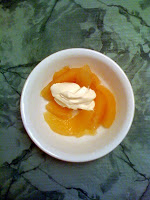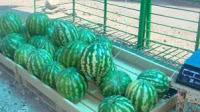 Have you ever taken a bite out of a quince? You’d remember if you did.
Have you ever taken a bite out of a quince? You’d remember if you did.
Like olives, quince is not edible when first picked. It looks like a yellow pear and smells deliriously sweet, but the fruit inside is a tongue-puckering nightmare that instantly sucks up every last trace of saliva.
Cooked quince, however, has been savored throughout Asia and the Mediterranean region for more than 4,000 years. Armenians have a particular fondness for quince that’s candied, jellied or cooked in stew to lend its sweetness to meat.
It’s a treat that most Americans will never taste, as quince isn’t stocked in most grocery stores here. Case in point: I went to my local supermarket and asked the produce manager where I could find the quince. He thought for a moment, walked with me to a display, and handed me a persimmon! Not even close! I suggested he research his produce some more. You really have to search for it, and most people don’t know enough to bother.
Doug remembers his father’s delight at discovering a quince tree in a friendly neighbor’s yard. The neighbor had no use for the fruit, so bushels of it were cheerfully passed over the fence to find their way into pot after pot on his Mom’s stove.
The Romans used the fruit and flowers of the quince for perfume and honey. The quince symbolized love, and was given as a sign of commitment to that special person.
It has a yellowish skin and hard, off-white interior. Its peak season is October to December. Because quince is high in pectin, it’s great as jelly, jam or preserves. Peel it before using it in any sweet or savory dish, and never-ever try to eat it raw!
Here’s a recipe from The Assyrian Cookbook, created by the women of the Assyrian Orthodox Church of the Virgin Mary, Paramus, N.J.
NOTE: Because we haven’t been able to find any quince this season, this recipe has not been tested in The Armenian Kitchen – yet.
HYVAH – Quince and Lamb Stew
Yield: 4 to 5 servings
Ingredients:
2 lbs. lamb, trimmed and cubed
3 lbs. quince, peeled and cut into 2 inch pieces
4 Tbsp. butter
2 Tbsp. sugar
Juice of 1 lemon
½ tsp salt
Directions:
1. Cover lamb with water. Bring to a boil, removing foam as it rises to surface.
2. Cover and cook until tender, about 1 hour.
3. Brown quince in butter.
4. Add quince and remaining ingredients to meat. Cover and simmer until tender.
Quince: The confoundingly delicious Armenian fruit – and – a recipe for Hyvah, a quince and lamb stew

(Visited 589 times, 1 visits today)




I am always learning something new here. Thanks for explaining; I'd heard of quince but had no idea…
I tried this recipe (actually, a variation, with the addition of onion, pine nuts, cinnamon and nutmeg) and it came out OK, but I felt like something was missing. Next time, I am going to try adding some red wine and maybe a bay leaf. Clove maybe? Cumin?
My Grandmother made Quince Stew when I was a kid. My uncle had a tree in his yard and very few people even heard of the fruit much less knowing what to do with it.Being brought up in the church when it was located in West New York back in the 50's it was a normal part of our upbringing. I think some specialty markets may have it if anyone is looking for it. Try Whole Foods or Fairway, Trader Joes may even have it
Quince varies in different regions and cold weather, the fruit is rich gold in color, has a heady perfume and a solid form. The bark is rough and the meat was difficult. In a warmer climate, the fruits can be eaten raw and woolly crust is not there. Quince is often used to make jelly because of its tangy taste and astringent.
Buy Xanax Online